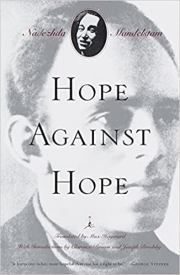Nadezhda Mandelstam - Hope Against Hope
 | Название: | Hope Against Hope |
Автор: | Nadezhda Mandelstam | |
Жанр: | Старинная литература | |
Изадано в серии: | неизвестно | |
Издательство: | неизвестно | |
Год издания: | 1933 | |
ISBN: | неизвестно | |
Отзывы: | Комментировать | |
Рейтинг: | ||
Поделись книгой с друзьями! Помощь сайту: донат на оплату сервера | ||
Краткое содержание книги "Hope Against Hope"
Suddently, at about one o'clock in the morning, there was a sharp, unbearably explicit knock on the door. 'They've come for Osip', I said'. In 1933 the poet Osip Mandelstam- friend to Boris Pasternak and Anna Akhmatova- wrote a spirited satire denouncing Josef Stalin. It proved to be a sixteen-line death sentence. For his one act of defiance he was arrested by the Cheka, the secret police, interrogated, exiled and eventually re-arrested. He died en route to one of Stalin's labour camps. His wife, Nadezhda (1899-1980) was with him on both occasions when he was arrested, and she loyally accompanied him into exile in the Urals, where he wrote his last great poems. Although his mind had been unbalanced by his ordeal in prison, his spirit remained unbroken. Eager to solve 'the Mandelstam problem', the Soviet authorities invited the couple to stay in a rest home near Moscow. Nadezhda saw it as an opportunity for her husband to mend his shattered life, but it was a trap and he was arrested for the last time. 'My case will never be closed', Osip once said, and it is mostly through the courageous efforts of Nadezhda that his memory has been preserved. Hope against Hope, her first volume of memoirs, is a vivid and disturbing account of her last four years with her husband, the efforts she made to secure his release, to rescue his manuscripts from oblivion, and later, tragically, to discover the truth about his mysterious death. It is also a harrowing, first-hand account of how Stalin and his henchmen persecuted Russia's literary intelligentsia in the 1930s and beyond. Nadezhda Mandelstam spent most of the Second World War in Tashkent, living with her friend Akhmatova. Only in 1964 was she at last granted permission to return to Moscow. Here she began Hope against Hope, and later Hope Abandoned, the two memoirs of her life.
Читаем онлайн "Hope Against Hope". [Страница - 3]
- 1
- 2
- 3
- 4
- 5
- . . .
- последняя (150) »
it cannot be But I am pigeon-liver'd, and lack gall To make oppression bitter.
To all of which Yeats directly alludes when speaking of the essential gaiety of art in his "Lapis Lazuli":
They know that Hamlet and Lear are gay Gaiety transfiguring all that dread.
All things fall and are built again And those that build them again are gay.
In an early essay on Pushkin and Scriabin, of which only fragments remain, Mandelstam was evidently trying to find the source of this joy within the terms of Christianity. Christian art is joyous because it is free, and it is free because of the fact of Christ's having died to redeem the world. One need not die in art nor save the world in it, those matters having been, so to speak, attended to. What is left? The blissful responsibility to enjoy the world. Such, I take it, was the argument, as one can see it, from what is left. Whether in later years Mandelstam would have sought quite this underpinning for his innate gladness in ttfe, I cannot tell. Perhaps the missing segments of this same essay might have modulated the statement in some way. But that is beside the essential point, which is that Mandelstam habitually converted not only the prose of life but even its truly darker moments into poems from which a sense of pleasure, even beatitude, is seldom absent.
Nadezhda Yakovlevna says in one place that he drew strength from what might drive others, herself included, into despair. But that is unfair. For her ample spirit, no less than the poet's creative gaiety, lends to her book its air of ultimate triumph.
Ill
It is one of the drabber commonplaces of literary history that the reputation of a poet generally suffers some diminution in the years just following his death. That Osip Mandelstam escaped this fate may be attributed in part to the peculiar circumstances of his demise.
For years it was not even known for sure that he was in fact dead; and by the time the facts began to be more widely known—in the late fifties, more or less—the rise in Mandelstam's posthumous celebrity had already begun its phenomenal course. At the present moment there can be little doubt that among connoisseurs of Russian poetry he is the supreme verbal artist of this century.
This alone would make Nadezhda Yakovlevna's book absorbing enough, for she discusses the poetry of Mandelstam, especially the work of the exile years, with great sensitivity and with, needless to say, unimpeachable authority as regards the outward conditions of its origin.
His fame as a poet had been firmly established, however, in the decade before he met his future wife in 1919—a decade which, like all of his earlier life, she largely neglects, as she neglects everything of which she has no immediate knowledge. I shall therefore append the bare externals of that earlier life.
Osip Emilievich Mandelstam was born in Warsaw on January 15, 1891. His father was Emil Veniaminovich Mandelstam, a leather merchant, and his mother was born Flora Osipovna Verblovskaya. She was a teacher of piano, a woman of warm heart and cultivated intellect. Mandelstam grew up in St. Petersburg—the fact is by no means commonplace in the biography of Russian Jews of the period and argues his father's eminence in the guild that regulated such matters—and attended the Tenishev School. This was a progressive institution combining the classical disciplines with up-to-date commercial, scientific and even manual skills, and the roster of its graduates before the Revolution reads like a catalogue of Russian eminence for the first half of this century. When he finished in 1907, he went to Paris, took rooms across the street from the Sorbonne and read. The winter of 1909-10 he spent as a student in Heidelberg. He also attended the University of St. Petersburg for a brief time.
His earliest fame as a poet is connected with Apollon, one of the elegant journals of art and literature that adorned the revival of Russian taste around the turn of the century, and above all with a group of young poets who called themselves "Acmeists." They were in varying degrees willingly dominated by Nikolai Gumilev, a man of great fortitude (he died before a firing squad for complicity in a plot against the "new reality"), uncanny discernment in judging the poetry of his day, and himself not meanly gifted in the making of verses. He, with Anna Akhmatova and Osip Mandelstam, formed the trio whose work will save Acmeism from the transiency of many another such casual association and make it one of the permanent facts of Russian literary history.
He greeted Mandelstam's first book, Kamen {Stone), published in 1913, in the pages of Apollon. This little green brochure is today a great rarity, and even contemporary readers, as a matter of fact, tend to be more familiar with the second edition, considerably enlarged, of 1916. After the Revolution, a good part of which Mandelstam spent in the relatively humane environment of the Black Sea coast, his second book, Tristia, appeared in 1922 and again, under the title Vtoraya kniga (Second Book), in 1923—this time with a dedication to Nadezhda Yakovlevna. In 1925 he published a collection of autobiographical prose called Shvm vremeni (The Noise of Time). Mandelstam's collected poems appeared in 1928 under the simple title Stikhotvorenia (Poems) and contained, in addition to the first two books, a section called "1921-1925." If one takes this as his "third book," one has accounted for all the poetry that he published in book form in his life. That same year there was also a book of criticism, О poezii (On Poetry) and a new edition of The Noise of Time, retitled Egipetskaya marka (The Egyptian Stamp) after a novella that had been added to it. The cumulative appearance of his work in verse, criticism and prose makes 1928 the "height" of his career. As Nadezhda Yakovlevna points out, this public summit was reached a few years after his real private position had begun to erode very dangerously.
Since 1955, owing to the truly heroic efforts of two Russian emigre scholars, Professor Gleb Struve and Mr. Boris Filippov, Mandelstam's texts, including not only all of the above but also a great treasure of works never published before, have been appearing in the United States. A collected edition of his poetry has existed in the Soviet Union for over a decade, but the authorities have so constantly postponed its publication that it has become something of a not terribly amusing international literary joke. When it appears, if it ever does, it will entirely vanish from the bookstores within a matter, quite literally, of minutes.
Such is Mandelstam's stature among his countrymen at this moment. To attempt to characterize his art in so brief a note would be a waste of time, but to praise it without characterizing it would seem to me contemptuous of the reader's judgment. Faced with such indifferent alternatives, I shall simply postpone the whole matter for another place and ask that you take Mandelstam's status, for the moment, on faith. He is the greatest Russian poet of the modern period. Had the author of this book not lived, or
--">- 1
- 2
- 3
- 4
- 5
- . . .
- последняя (150) »


